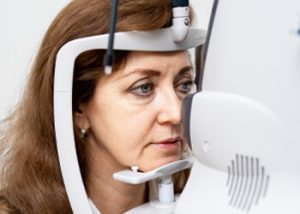What Causes Macular Degeneration? Recognising the Symptoms
When it comes to diseases that affect your eye health, many people are particularly afraid of age-related macular degeneration. In Australia, age-related macular degeneration is one of the top leading causes of visual impairment or blindness in older adults. Around 1 in 7 adults over 50 years of age have some stage of macular degeneration. So, what causes macular degeneration and how does your eye doctor diagnose and treat it? Keep reading to find out more about age-related macular degeneration.
What is the Macula and Age-Related Macular Degeneration?
The macula is an anatomical part of the retina, which is the sensory tissue lining the inside of the eyeball. The macula is responsible for our central vision, which we use for almost everything in daily life. This includes reading, writing, identifying faces, threading needles, watching TV, applying makeup, and even cutting vegetables. Although you are able to still see with parts of the retina outside of the macular area, these parts contain a much lower density of photoreceptors, so your ability to discern fine detail is significantly poorer here. The macula is also the part of the retina that contains cone photoreceptors, which we use for colour perception.
As the name suggests, age-related macular degeneration is an eye disease of older adults. It typically becomes a risk after the age of 50. Contrary to the belief of some, it is not a normal or natural part of ageing.
Age-related macular degeneration occurs when the photoreceptors and the tissues that support these cells begin to deteriorate. This affects your central sight, resulting in symptoms such as:
- Dark and missing patches around your central vision
- Blurry or distorted sight
- Difficulty with seeing fine details
- A fading of your colour vision
Because this disease affects only the macular area, you will still have functional peripheral sight. Although some people may be classified as legally blind, macular degeneration does not cause full and complete blindness.
If you have macular degeneration, you may be cared for by an eye doctor, such as a retinal specialist or a general ophthalmologist. Your local optometrist may also have the necessary equipment and experience to monitor your eye health.
What Causes Macular Degeneration?
At the moment, we still need more research to fully understand what causes macular degeneration. Your eye doctor considers it to be a combination of genetic and environmental factors; however, this still doesn’t give the full picture of the changes in eye health seen in age-related macular degeneration.
The underlying pathophysiology – the abnormal physiological process that underpins macular degeneration – is known to be due to the deterioration of the retinal pigment epithelium (RPE). This is one of the tissues of the retina that support the energy demands of the overlying photoreceptor layer. The RPE can accumulate waste material in its cells, known as drusen. The presence of drusen disrupts the ability of the RPE to perform its function properly; subsequently, the photoreceptors begin to deteriorate also.
Research undertaken to understand what causes macular degeneration has uncovered some risk factors associated with developing the disease. These include:
- Older age
- Family history of macular degeneration
- Smoking (which is detrimental to all aspects of eye health)
- Obesity
- Cardiovascular disease
- Caucasian ethnicity
Despite this, it is possible to possess all these risk factors and never develop the disease.
Diagnosis and Management
Diagnosis of macular degeneration can be performed by an eye doctor or an optometrist. Diagnosis is fairly straightforward, requiring a physical examination of the retina and a measurement of your visual acuity to aid with monitoring progression. Many clinicians also consider the use of a device called an optical coherence tomographer the gold standard for providing invaluable information about the RPE and photoreceptor layers.
 In some cases, you may be referred to a retinal specialist. However, a confident general ophthalmologist or optometrist is also well-positioned to monitor your eye health. There is no cure for macular degeneration at this time. One form of the condition known as dry macular degeneration cannot be treated, only monitored for progression into the wet form. The wet form of macular degeneration involves the formation of abnormal blood vessels, which can leak blood and fluid into the retina, causing profound vision loss. Wet macular degeneration is managed by a retinal specialist through regular eye injections of a drug to prevent and reduce the growth of these blood vessels.
In some cases, you may be referred to a retinal specialist. However, a confident general ophthalmologist or optometrist is also well-positioned to monitor your eye health. There is no cure for macular degeneration at this time. One form of the condition known as dry macular degeneration cannot be treated, only monitored for progression into the wet form. The wet form of macular degeneration involves the formation of abnormal blood vessels, which can leak blood and fluid into the retina, causing profound vision loss. Wet macular degeneration is managed by a retinal specialist through regular eye injections of a drug to prevent and reduce the growth of these blood vessels.
People affected by visual impairment from age-related macular degeneration can be referred to low-vision services such as Vision Australia or Guide Dogs Australia. Your eye doctor, GP, or optometrist can organise a referral for you. You may also find that having good task lighting when reading or writing can make it easier to see or enlarge the font size when reading on a screen. If your sight drops below a certain level of acuity, you will no longer be permitted to hold a driver’s licence, which can be particularly difficult for many. You may wish to research public transport routes to your common destinations or look into what community or council transport services are available in your area.
Though it’s not possible to guarantee you’ll never get macular degeneration, you can take steps to reduce your risk. Quit smoking if you’re a smoker, and address any problems with cardiovascular disease or obesity. You may also wish to ask your optometrist or eye doctor about the benefit of nutritional supplements for macular health.
Contact us now on (03) 9070 3580.
Note: Any surgical or invasive procedure carries risks. Before proceeding, you should seek a second opinion from an appropriately qualified health practitioner.
References
Vision problems in older adults.
https://www.aihw.gov.au/reports/eye-health/vision-problems-in-older-australians/summary
Age-related macular degeneration.
https://www.mdfoundation.com.au/about-macular-disease/age-related-macular-degeneration/AMD-overview/
Driving and vision loss.
https://www.mdfoundation.com.au/living-well/living-with-vision-loss/driving-and-vision-loss/






Leave a Reply
Want to join the discussion?Feel free to contribute!